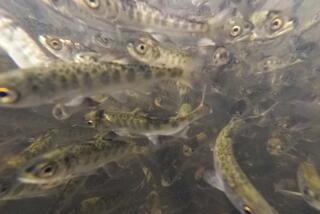A Pool Issue You Can’t Duck
- Share via
The last few minutes of the drive are beautiful. Well off the 5 Freeway in Orange County, you eventually make your way to a winding, tree-lined boulevard that leads to the crest of a hill, from which you can look over a vista encompassing a canyon and, off in the distance, a wedge of the Pacific Ocean. Then, down a small street to the community clubhouse where, out back and overlooking another spectacular view, the 60-foot-long swimming pool glistens under the morning sun.
“Let’s just sit here and soak up the atmosphere,” my hosts say as we sit poolside. “Isn’t it great?”
As Jack Nicholson might say, as good as it gets.
However, on to the business at hand. After soaking up atmosphere, my hosts take me to the edge of the pool and have me look in.
At several places at the bottom of the pool, I see dark blotches.
“Are those markings on the pool?” I ask, thinking the paint had chipped away.
“They weren’t there yesterday,” says one of my hosts.
I figure as much. What we have is a situation that plagues thousands of people every year, and led this particular couple to a particularly unpleasant skirmish with their residents association board members last year. That’s right, duck droppings in the pool.
The couple like to swim, especially the wife. She’s serious about it and likes to submerge her face in the water.
That is decidedly less invigorating, however, when the pool is decorated with duck feces. “The stuff is slimy,” she says. “It clings to you before it drops to the bottom.”
“Well, at least the pool isn’t covered with it,” I say.
“Not yet,” her husband says.
So touchy is the issue that my hosts insist on anonymity. Like a lot of people, they’ve complained to their board of directors, asking why it can’t take steps to discourage the ducks. Some association boards move aggressively on the matter. Some don’t. This particular board has moved somewhat slowly, my hosts say, but they don’t want to knock them publicly. “You open your mouth in a place like this, other than to commend the board, and you’re dead,” the woman says.
The couple know the droppings are unsanitary, not to mention aesthetically repellent. They wonder why, when they pay all this money to live in a nice place, management can’t keep the stuff out of the pool. They don’t think it should be the residents’ responsibility to discourage ducks.
As if that’s an easy task, anyway.
“They don’t get out of the pool easily,” the woman says, knowingly. “They really don’t. That’s a terrible problem.”
“So, you’ve spotted them while you’re swimming?” I ask.
“Spotted them?” she says. “Oh, they come in when you’re swimming.”
The management company has authorized residents to spray the ducks with a hose, but that’s not as easy as it sounds, my hosts say. “You’ve got to hit them really hard,” the woman says. “You’ve got to knock them out, practically.”
I took the problem to Lt. Marie Hulett with Orange County’s animal control office. She laughed, but only, she says, because she hears these complaints every year.
“Basically, this is just a normal part of living out here,” Hulett says. “Anybody who has a pool is going, most likely, to have some ducks who come by and visit in the spring and possibly have a family. It’s just one of the things that happens if you happen to have a pool.”
That sounds like she’s describing visits from long-lost friends from the Midwest. These people are upset, I point out to her. And it’s all because of the ducks.
“They’re not going to be there long,” Hulett says of the ducks. “If there’s a pair of them, they’re going to find a place to lay eggs. Four weeks later the eggs will hatch, Mom will take her babies to the water, you’ll see all the ducklings swimming around in the water with Mom. Ten to 12 weeks after that, they’ll all fly away and you won’t see them till next year.”
Large beach balls might discourage ducks from settling in a pool, but “that’s not foolproof,” she says. Or, people can cover their pools to keep the ducks away when people aren’t swimming.
One thing is certain. Once the ducks have nested and produced ducklings, it’s illegal to disturb them. Heavy federal fines, in the thousands of dollars, can be levied against anyone disturbing a duck family, Hulett warns.
That probably accounts for the board’s hesitation in cracking down on the ducks.
All of which has left my hosts grumbling.
Paradise on Earth?
Sure is.
Just ask the ducks.
*
Dana Parsons is a columnist for The Times’ Orange County edition. His e-mail address is dana.parsons@latimes.com
Columnist Patt Morrison is ill
More to Read
Sign up for The Wild
We’ll help you find the best places to hike, bike and run, as well as the perfect silent spots for meditation and yoga.
You may occasionally receive promotional content from the Los Angeles Times.






